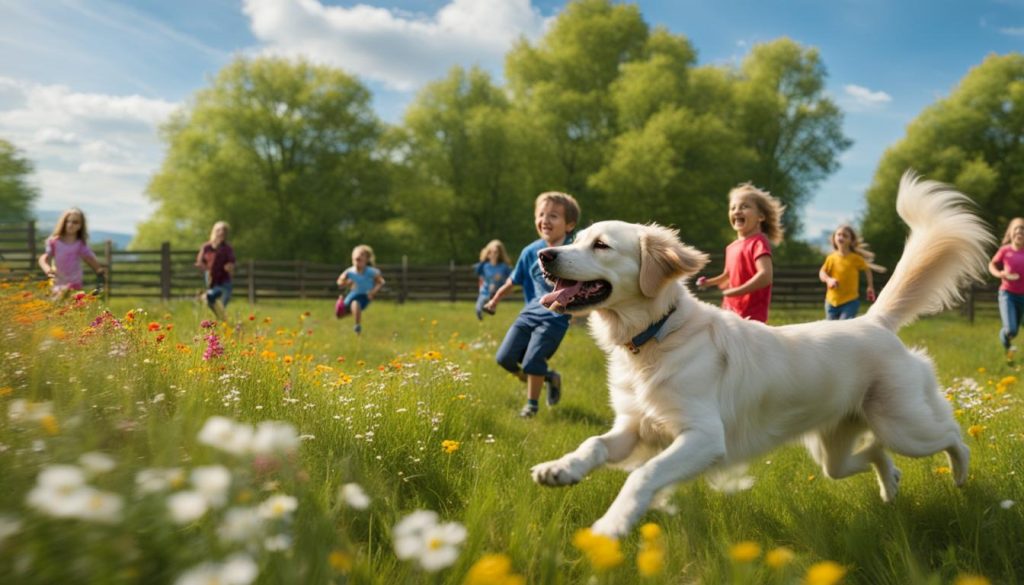As a dog owner, have you ever wondered why your furry friend has a habit of nibbling on blankets? This behavior can be both intriguing and concerning, but it’s essential to understand the reasons behind it. By delving into the world of canine behavior, we can shed light on this curious habit and ensure the well-being of our beloved pets.
Dogs, like humans, exhibit a range of behaviors that can vary from one individual to another. Nibbling on blankets is no exception. It’s crucial to note that this behavior can stem from various factors, including nutritional deficiencies, lack of exercise and mental stimulation, teething, anxiety, parasites, and attention-seeking tendencies.
Key Takeaways:
- Dogs may nibble on blankets due to various reasons such as malnutrition, lack of exercise, teething, anxiety, parasites, and attention-seeking behavior.
- Providing a well-balanced, high-protein diet helps prevent nutritional deficiencies and reduce blanket nibbling tendencies.
- Regular exercise, mental stimulation, and socialization are essential to prevent boredom and alleviate the need for dogs to chew on blankets.
- Puppies often nibble on blankets during the teething stage to soothe their sore gums. Providing appropriate chew toys can help address this behavior.
- Anxiety and stress can lead to blanket nibbling. Identifying and addressing the root cause is crucial in helping dogs manage their stress in healthier ways.
Malnutrition and Nutritional Deficiencies
Excessive nibbling on blankets can be a sign of hunger and malnutrition in dogs. When dogs do not receive sufficient nutrients in their diet, they may resort to chewing on non-food items, such as blankets, in an attempt to fulfill their nutritional needs. This behavior is especially prevalent in dogs that are not provided with a well-balanced, high-protein diet.
To prevent malnutrition-related blanket nibbling habits in dogs, it is crucial to ensure that their diet is nutritionally complete. A balanced dog food should contain all the essential nutrients, including proteins, carbohydrates, fats, vitamins, and minerals. Consulting with a veterinarian can help determine the appropriate diet for your dog based on their age, breed, and specific nutritional needs.
In addition to providing a proper diet, offering suitable chewing alternatives, such as chew toys or dental chews, can redirect your dog’s chewing behavior away from blankets. These alternatives can help satisfy their need to chew while promoting dental health. Regular veterinary check-ups are also important to monitor your dog’s overall health and identify any potential nutritional deficiencies that may contribute to blanket nibbling.
| Signs of malnutrition in dogs | Prevention and solutions |
|---|---|
| Weight loss or poor weight gain | Ensure a nutritionally complete diet |
| Dull or dry coat | Consult with a veterinarian for dietary recommendations |
| Lethargy or decreased activity | Offer appropriate chew toys to redirect chewing behavior |
| Loss of appetite | Regular veterinary check-ups to monitor overall health |
Lack of Exercise and Mental Stimulation

Dogs are naturally active and intelligent animals that thrive on physical exercise and mental stimulation. When dogs do not receive enough opportunities for exercise and mental engagement, they can become bored, restless, and seek alternative ways to alleviate their pent-up energy and boredom. One way dogs may manifest their frustration is through nibbling on blankets.
Blanket nibbling can serve as a form of self-entertainment for dogs, providing them with a physical and sensory outlet when they lack other sources of mental stimulation. By chewing on blankets, dogs can engage their jaws and explore different textures, which can help alleviate boredom momentarily.
However, excessive blanket nibbling due to a lack of exercise and mental stimulation may indicate an underlying issue. Dogs that are routinely left alone for long periods without opportunities for physical activity and mental enrichment can develop behavioral problems, including destructive chewing.
Effects of Lack of Exercise and Mental Stimulation on Dogs:
- Restlessness
- Boredom
- Excessive energy
- Destructive behavior
To prevent blanket nibbling resulting from a lack of exercise and mental stimulation, dog owners should prioritize providing regular exercise sessions, interactive toys, and engaging activities that challenge their furry companions mentally. This can include daily walks, playtime, puzzle toys, and obedience training sessions to keep their minds and bodies active and fulfilled.
| Causes of Blanket Nibbling | Symptoms of Lack of Exercise and Mental Stimulation |
|---|---|
| Lack of physical activity | Restlessness |
| Insufficient mental stimulation | Excessive energy |
| Loneliness and boredom | Destructive behavior |
Teething and Comfort

During the teething stage, puppies often have sore gums and may experience discomfort. To alleviate this pain, they may resort to nibbling on blankets. The act of nibbling helps soothe their gums and provides them with a sense of comfort. It is their way of exploring and adapting to their changing teeth.
Furthermore, dogs may also chew on blankets for comfort if they are healing from an injury or experiencing allergies. The soft texture of blankets can provide a soothing sensation and help them feel secure during their recovery. However, it is essential to ensure that dogs do not ingest any loose threads or fibers, as this could lead to digestive issues or blockages.
Providing appropriate chew toys specifically designed for teething puppies can help alleviate their discomfort and redirect their chewing behavior towards more suitable items. Cold cloths can also be given to aid in numbing their gums. These safe alternatives can satisfy their natural urge to chew while promoting healthy dental development.
It is important to note that if your adult dog suddenly starts chewing on blankets, it may be a sign of an underlying issue, such as anxiety or stress. In such cases, it is recommended to observe their behavior closely and consult with a veterinarian or professional dog behaviorist to address the root cause of the problem.
Table: Common Reasons for Dogs Nibbling on Blankets
| Reasons | Description |
|---|---|
| Teething | Puppies may chew on blankets to soothe their sore gums during the teething stage. |
| Comfort | Dogs may seek comfort by chewing on blankets when healing from an injury or experiencing allergies. |
| Malnutrition | If dogs are not receiving sufficient nutrients in their diet, they may resort to chewing on non-food items like blankets. |
| Lack of Exercise | Dogs that do not receive enough physical and mental stimulation may engage in blanket nibbling as a way to alleviate boredom. |
| Anxiety | Anxiety and stress can trigger dogs to seek comfort by chewing on blankets. |
| Parasites | Dogs with external parasites or fleas may exhibit excessive nibbling or chewing behavior, including on blankets. |
| Attention-Seeking | Sometimes dogs chew on blankets as a way to seek attention from their owners. |
In summary, dogs may nibble on blankets for various reasons, including teething, seeking comfort, and coping with anxiety or stress. Providing appropriate chew toys, cold cloths, and a safe environment can help redirect their chewing behavior and ensure their well-being. However, it is important to monitor any sudden changes in chewing habits and seek professional guidance if necessary.
Understanding Dogs and Blanket Nibbling

Blanket nibbling in dogs is a behavior that can be indicative of anxiety and stress. Dogs, like humans, can experience various forms of anxiety, which may lead them to seek comfort through chewing on blankets. Changes in the household, such as moving to a new home, or separation from their owners can trigger anxiety in dogs, causing them to engage in this behavior.
To address the underlying causes of blanket nibbling due to anxiety, it is important to provide proper training and support. Creating a safe and comforting environment for your dog, establishing a routine, and implementing positive reinforcement techniques can help them manage stress in healthier ways.
Additionally, it is crucial to consult with a veterinarian or a professional dog behaviorist to develop a comprehensive plan to address your dog’s anxiety. They can provide guidance and recommend appropriate behavioral interventions or, if necessary, medication to help alleviate your dog’s anxiety and minimize blanket nibbling tendencies.
Table: Factors contributing to anxiety in dogs
| Factors | Effects on Dogs |
|---|---|
| Changes in the household | Increased stress levels |
| Moving to a new home | Feeling disoriented and anxious |
| Separation from owners | Feeling lonely and anxious |
To summarize, understanding the reasons behind blanket nibbling in dogs, such as anxiety and stress, is crucial for creating a supportive environment and implementing appropriate interventions. By addressing these underlying factors and providing the necessary resources, you can help your dog manage their anxiety in healthier ways, ultimately reducing their tendency to chew on blankets.
Parasites and Fleas

One of the reasons why dogs nibble on blankets is due to the presence of parasites and fleas. These external pests can cause itchiness and discomfort for dogs, leading them to seek relief by chewing on blankets. It is essential to address the underlying issue of parasites and fleas to eliminate the source of itching and reduce blanket chewing tendencies in dogs.
When dogs have parasites or fleas, their intense itching can be unbearable. This can drive them to chew on blankets in an attempt to alleviate the discomfort. Treating the infestation with appropriate medications and regular grooming can help eliminate parasites and fleas, providing much-needed relief for your furry friend.
To prevent the recurrence of parasite and flea infestations, it is advisable to maintain a clean and hygienic living environment for your dog. Regularly wash their bedding and vacuum your home thoroughly to remove any eggs, larvae, or adult pests. Additionally, using preventive measures such as flea collars or spot-on treatments recommended by your veterinarian can help keep your dog free from parasites and reduce the likelihood of blanket nibbling behavior.
| Preventive Measures | Treatment Options |
|---|---|
| Regular grooming | Topical flea treatments |
| Clean and wash dog bedding regularly | Oral medications for parasites |
| Vacuum and clean the home environment | Flea collars |
| Avoid contact with other infested animals | Environmental sprays for flea control |
By addressing the presence of parasites and fleas in dogs and taking appropriate preventive and treatment measures, dog owners can effectively reduce blanket chewing tendencies and ensure the well-being of their beloved pets.
Unraveling the Mystery of Dogs and Blanket Nibbling

When it comes to understanding dog behavior with blanket nibbling, there are a few key reasons why dogs engage in this behavior. It’s essential for dog owners to recognize these reasons to address the underlying causes and promote healthier habits in their furry friends.
Reasons for Dogs Nibbling on Blankets
1. Anxiety and Stress: Dogs may chew on blankets as a way to alleviate anxiety or stress. This behavior can be triggered by changes in the household, such as moving to a new home or separation from their owners. Identifying the root cause of anxiety and providing proper training and support can help dogs manage their stress in healthier ways.
2. Attention-Seeking Behavior: Some dogs may nibble on blankets as a way to seek attention from their owners. If this behavior is reinforced by receiving attention or affection, dogs may continue to engage in it. It’s important to provide alternative sources of attention and redirect their focus to more appropriate activities.
3. Teething and Comfort: Puppies, in particular, may nibble on blankets during the teething stage. This behavior helps soothe their sore gums and provides comfort. Additionally, dogs may chew on blankets for comfort if they are healing from an injury or experiencing allergies. Providing appropriate chew toys and cold cloths can help alleviate teething discomfort and promote healthy chewing habits.
How to Address Blanket Nibbling
To prevent blanket nibbling in dogs, it’s crucial to provide a stimulating environment and address the underlying causes:
- Ensure your dog receives regular exercise and mental stimulation to alleviate boredom and release pent-up energy.
- Offer appropriate chew toys and redirect their attention to these toys when they show interest in nibbling on blankets.
- Establish a routine for your dog, including feeding times, exercise periods, and playtime.
- Consider using deterrent sprays specifically designed to discourage dogs from chewing on blankets.
- Praise and reward desired behavior, such as choosing to chew on their toys instead of blankets.
| Reasons for Dogs Nibbling on Blankets | Prevention Strategies |
|---|---|
| Anxiety and Stress | Identify and address the root cause of anxiety, provide training and support |
| Attention-Seeking Behavior | Provide alternative sources of attention, redirect focus to appropriate activities |
| Teething and Comfort | Offer appropriate chew toys, provide cold cloths for teething discomfort |
Tips to Prevent Blanket Nibbling
If your dog has a tendency to nibble on blankets, there are several strategies you can implement to discourage this behavior and promote healthier chewing habits. By addressing the underlying causes and providing a stimulating environment, you can help minimize your dog’s urge to chew on blankets and ensure their overall well-being.
1. Provide Adequate Exercise and Mental Stimulation
One of the key reasons dogs nibble on blankets is due to boredom or pent-up energy. Make sure your dog receives regular exercise through daily walks, playtime, and interactive toys. Additionally, engage your dog’s mind with puzzle toys, obedience training, and interactive feeding games to keep them mentally stimulated.
2. Offer Appropriate Chew Toys
Redirect your dog’s chewing behavior by providing them with a variety of safe and durable chew toys. Opt for toys that are specifically designed for dogs, such as rubber or nylon chew toys. Avoid giving your dog old or worn-out blankets as chew toys, as this can confuse them and reinforce the habit of nibbling on blankets.
3. Establish a Routine
Dogs thrive on routine, so establishing a consistent daily schedule can help reduce anxiety and promote healthier behaviors. Set designated times for meals, walks, playtime, and rest. By providing structure and predictability, you can help alleviate stress and prevent blanket nibbling as a result of anxiety.
4. Use Deterrent Sprays
If your dog continues to show interest in nibbling on blankets, consider using deterrent sprays specifically formulated for dogs. These sprays emit a scent or taste that dogs find unpleasant, discouraging them from chewing on the sprayed items. Always follow the instructions on the spray and consult with a veterinarian if needed.
5. Praise and Reward Desirable Behavior
Positive reinforcement plays a crucial role in shaping your dog’s behavior. Whenever your dog engages in appropriate chewing behavior, such as chewing on their chew toys instead of blankets, praise them and offer rewards, such as treats or praise. This will reinforce the desired behavior and motivate your dog to continue making the right choices.
By implementing these tips, you can help prevent blanket nibbling in your dog and create a more harmonious living environment. Remember to be patient and consistent with your training efforts, and always consult with a professional trainer or veterinarian if you need further guidance.
Wrapping Up
Unraveling the mystery of dogs and blanket nibbling reveals that there are various reasons behind this behavior. Nutritional deficiencies and hunger can drive dogs to nibble on blankets, emphasizing the importance of a well-balanced diet. Lack of exercise and mental stimulation can also lead to blanket chewing, highlighting the need for regular physical activity and mental engagement.
Teething and comfort-seeking are common factors, particularly in puppies, where nibbling on blankets helps soothe their sore gums. Anxiety and stress can also contribute to blanket nibbling, making it essential to address the underlying causes and provide appropriate training and support. Additionally, parasites and fleas can cause itching and discomfort, prompting dogs to chew on blankets for relief.
Understanding dogs and their blanket nibbling tendencies allows us to implement preventive measures. By establishing a stimulating environment, offering suitable chew toys, and redirecting attention-seeking behaviors, we can encourage healthier chewing habits. With care and attention, we can unravel the mystery of dogs and blanket nibbling and ensure the well-being of our furry companions.
FAQ
Why do dogs nibble on blankets?
Dogs may nibble on blankets for various reasons, including hunger and malnutrition, lack of exercise and mental stimulation, teething and comfort, anxiety and stress, presence of parasites or fleas, and attention-seeking behavior.
How can malnutrition and nutritional deficiencies contribute to blanket nibbling in dogs?
Dogs that are not receiving sufficient nutrients in their diet may resort to chewing on non-food items, such as blankets, in an attempt to fulfill their nutritional needs. It’s crucial to provide your dog with a well-balanced, high-protein diet to prevent deficiencies and reduce the urge to nibble on blankets.
What role does lack of exercise and mental stimulation play in blanket nibbling?
When dogs do not receive enough physical and mental activity, they may engage in unwanted behaviors, such as nibbling on blankets, as a way to alleviate boredom or release pent-up energy. It’s important to provide your dog with ample opportunities for exercise, play, and socialization to prevent blanket chewing due to lack of stimulation.
Why do puppies nibble on blankets?
Puppies may nibble on blankets during the teething stage to soothe their sore gums and provide comfort. Additionally, dogs may chew on blankets for comfort if they are healing from an injury or experiencing allergies. Providing appropriate chew toys and cold cloths can help alleviate teething discomfort and promote healthy chewing habits.
How does anxiety and stress contribute to blanket nibbling in dogs?
Dogs can experience anxiety and stress, which may manifest in behaviors like blanket nibbling. Changes in the household, moving to a new home, or separation from their owners can trigger anxiety in dogs, leading them to seek comfort by chewing on blankets. It’s crucial to address the root cause of anxiety and provide proper training and support to help dogs manage their stress in healthier ways.
Can parasites and fleas cause dogs to nibble on blankets?
Dogs that have parasites or fleas may exhibit excessive nibbling or chewing behavior. These external pests can cause itchiness and discomfort, leading dogs to chew on blankets for relief. Treating the underlying parasite issue is essential to eliminate the source of itching and reduce blanket chewing tendencies.
How does attention-seeking behavior relate to blanket nibbling in dogs?
Dogs may engage in blanket nibbling as a way to seek attention from their owners. If the behavior is reinforced by receiving attention or affection when chewing on blankets, dogs may continue to exhibit this behavior to gain the desired response. Providing alternative sources of attention and redirecting their focus to more appropriate activities can help curb attention-seeking behaviors like blanket nibbling.
What are some tips to prevent blanket nibbling in dogs?
Strategies to prevent blanket nibbling in dogs include providing adequate exercise and mental stimulation, offering appropriate chew toys, establishing a routine, using deterrent sprays, and praising and rewarding desirable behavior. By addressing the underlying causes and providing a stimulating environment, you can encourage healthier chewing habits in your dog and minimize blanket nibbling tendencies.
What should dog owners understand about blanket nibbling in dogs?
Nibbling on blankets is a common behavior in dogs and can be attributed to various factors, including nutrition, exercise, teething, anxiety, parasites, and seeking attention. By understanding the reasons behind this behavior and implementing appropriate strategies, dog owners can manage blanket nibbling tendencies and promote overall well-being in their furry companions.






